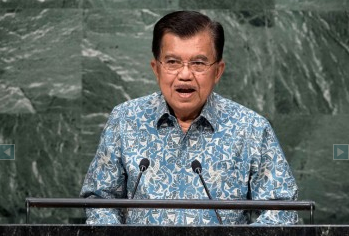Indonesian educators find an ally in Vice-President
After meeting with their country’s Vice-President, leaders of the teachers’ union Persatuan Guru Republik now have a political voice they can count on in their pursuit of a stronger teaching profession and quality education system.

Indonesian Vice-President: teacher union is the government’s strategic partner in advancing education
“Teachers, education environments and systems must coexist in harmony, as they are the main assets of education helping each other develop,” said Indonesia’s Vice-President Jusuf Kalla at the “Education dialog: national education and improving the role of the Persatuan Guru Republik Indonesia (PGRI) in the midst of change” event on 27 May in Jakarta.
Reminding that the public is currently asking for improved teacher quality, he acknowledged that, on the other hand, teachers demand better welfare. As a professional organisation, Kalla emphasised, the PGRI should show achievement in supporting progress of teacher quality and national education. The government continues to view PGRI as a strategic partner in advancing education, he ensured.
On the issue of teachers, Kalla explained that the uneven teacher distribution should be immediately be taken care of. Currently delegated to the regional authorities responsibility, education should be regulated so teachers are be able to move across regions, starting from the provincial level down to the city level.
PGRI: improving teacher and education quality
The acting PGRI President Unifah Rosyidi stressed that, as a teacher professional organisation, the PGRI continues to work hard on improving teacher and education quality.
She noted that the Vice-President “is very concerned about the education and acknowledges the importance of an existing synergy between the government, teachers and school leaders. If advancement of education is a measure of the nation's progress, the standard is a qualified and dedicated teacher.”
The PGRI is a government’s strategic partner, teachers and principals at all levels are committed to advancing the quality of national education, teacher quality, and the quality of learners, she emphasised.
Saying that there is a need for comprehensive teachers’ analysis, she detailed that massive teacher shortage mainly occurs in primary school, and the authority to raise teachers' salaries lays with local governments and there is a provision to protect the teaching profession by setting up a “minimum wage of professional teacher"
The PGRI, she further said, requests a legal protection for teaching profession, “as many teachers attempting to discipline students are languishing in jail,” the trade union being convinced that among those teachers none intended to harm students. In addition, PGRI is committed to encouraging teachers to change their teaching methods in a way that is appropriate to the child development and child-friendly.
EI: PGRI, a professional teacher organisation dedicated to quality education for all
“On behalf of the Education International (EI) Asia-Pacific regional office, we wish to congratulate the PGRI, its national and provincial boards and yourself for initiating a very fruitful dialogue with the Vice-President of the Republic of Indonesia,” wrote the EI Chief Regional Coordinator for Asia-Pacific Shashi Bala Singh in a message dated 31 May sent to Unifah Rosyidi.
Highlighting that the “kind gesture of the Vice-President of the country to have a dialogue with the PGRI in the PGRI building” gives a “positive indicator” for the trade union, especially in raising some of the issues teachers are confronted to and their demands, such as the shortage of teachers, quality teachers, contract teachers, the non-recognition of the employment status, and the lack of payroll protection, she added that EI supports the “PGRI’s endeavour to become a professional teacher organisation and its commitment to provide quality education to all through the appointment of regularly and professionally qualified teachers with decent working conditions”.
Source: Education International
- 304 reads
Human Rights
Ringing FOWPAL’s Peace Bell for the World:Nobel Peace Prize Laureates’ Visions and Actions

Protecting the World’s Cultural Diversity for a Sustainable Future

The Peace Bell Resonates at the 27th Eurasian Economic Summit

Declaration of World Day of the Power of Hope Endorsed by People in 158 Nations

Puppet Show I International Friendship Day 2020

